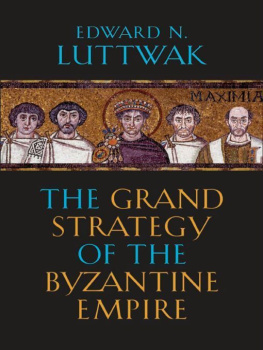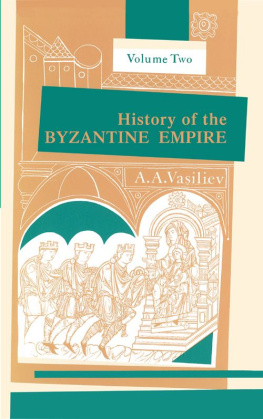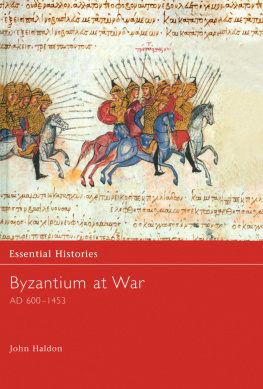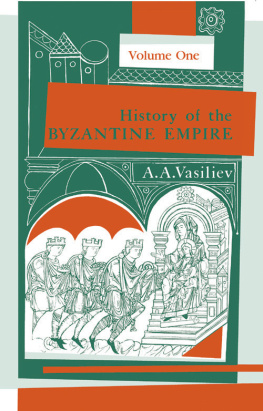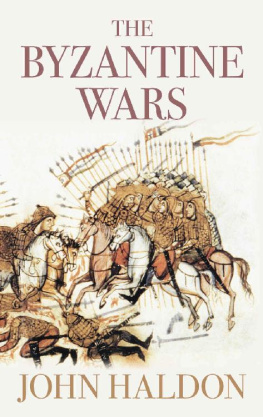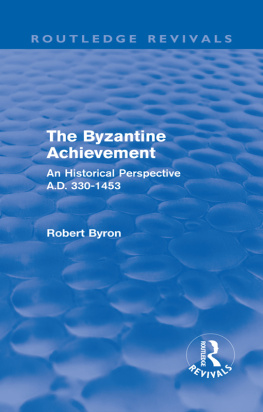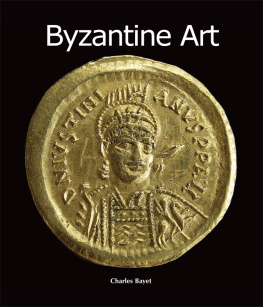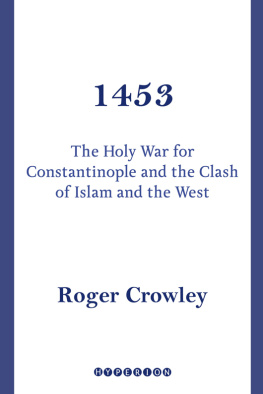SECTION I. CHARACTERISTICS OF BYZANTINE HISTORY ITS DIVISIONS EXTENT AND ADMINISTRATIVE DIVISIONS OF THE EMPIRE
THE INSTITUTIONS OF IMPERIAL ROME had long thwarted the great law of mans existence which impels him to better his condition, when the accession of Leo the Isaurian to the throne of Constantinople suddenly opened a new era in the history of the Eastern Empire. Both the material and intellectual progress of society had been deliberately opposed by the imperial legislation. A spirit of conservatism persuaded the legislators of the Roman empire that its power could not decline, if each order and profession of its citizens was fixed irrevocably in the sphere of their own peculiar duties by hereditary succession. An attempt was really made to divide the population into castes. But the political laws which were adopted to maintain mankind in a state of stationary prosperity by these trammels, depopulated and impoverished the empire, and threatened to dissolve the very elements of society. The Western Empire, under their operation, fell a prey to small tribes of northern nations; the Eastern was so depopulated that it was placed on the eve of being repeopled by Sclavonian colonists, and conquered by Saracen invaders.
Leo III. mounted the throne, and under his government the empire not only ceased to decline, but even began to regain much of its early vigour. Reformed modifications of the old Roman authority developed new energy in the empire. Great political reforms, and still greater changes in the condition of the people, mark the eighth century as an epoch of transition in Roman history, though the improved condition of the mass of the population is in some degree concealed by the prominence given to the disputes concerning image-worship in the records of this period. But the increased strength of the empire, and the energy infused into the administration, are forcibly displayed by the fact, that the Byzantine armies began from this time to oppose a firm barrier to the progress of the invaders of the empire.
When Leo III. was proclaimed Emperor, it seemed as if no human power could save Constantinople from falling as Rome had fallen. The Saracens considered the sovereignty of every land, in which any remains of Roman civilisation survived, as within their grasp. Leo, an Isaurian, and an Iconoclast, consequently a foreigner and a heretic, ascended the throne of Constantine, and arrested the victorious career of the Mohammedans. He then reorganised the whole administration so completely in accordance with the new exigencies of Eastern society, that the reformed empire outlived for many centuries every government contemporary with its establishment.
The Eastern Roman Empire, thus reformed, is called by modern historians the Byzantine Empire; and the term is well devised to mark the changes effected in the government, after the extinction of the last traces of the military monarchy of ancient Rome. The social condition of the inhabitants of the Eastern Empire had already undergone a considerable change during the century which elapsed from the accession of Heraclius to that of Leo, from the influence of causes to be noticed in the following pages; and this change in society created a new phase in the Roman empire. The gradual progress of this change has led some writers to date the commencement of the Byzantine Empire as early as the reigns of Zeno and Anastasius, and others to descend so late as the times of Maurice and Heraclius. But as the Byzantine Empire was only a continuation of the Roman government under a reformed system, it seems most correct to date its commencement from the period when the new social and political modifications produced a visible effect on the fate of the Eastern Empire. This period is marked by the accession of Leo the Isaurian.
The administrative system of Rome, as modified by Constantine, continued in operation, though subjected to frequent reforms, until Constantinople was stormed by the Crusaders, and the Greek church enslaved by papal domination. The General Council of Nica, and the dedication of the imperial city, with their concomitant legislative, administrative, and judicial institutions, engendered a succession of political measures, whose direct relations were uninterrupted until terminated by foreign conquest. The government of Great Britain has undergone greater changes during the last three centuries than that of the Eastern Empire during the nine centuries which elapsed from the foundation of Constantinople in 330, to its conquest in 1204.
Yet Leo III. has strong claims to be regarded as the first of a new series of emperors. He was the founder of a dynasty, the saviour of Constantinople, and the reformer of the church and state. He was the first Christian sovereign who arrested the torrent of Mohammedan conquest; he improved the condition of his subjects; he attempted to purify their religion from the superstitious reminiscences of Hellenism, with which it was still debased, and to stop the development of a quasi-idolatry in the orthodox church. Nothing can prove more decidedly the right of his empire to assume a new name than the contrast presented by the condition of its inhabitants to that of the subjects of the preceding dynasty. Under the successors of Heraclius, the Roman Empire presents the spectacle of a declining society, and its thinlypeopled provinces were exposed to the intrusion of foreign colonists and hostile invaders. But, under Leo, society offers an aspect of improvement and prosperity; the old population revives from its lethargy, and soon increases, both in number and strength, to such a degree as to drive back all intruders on its territories. In the records of human civilisation, Leo the Isaurian must always occupy a high position, as a type of what the central power in a state can effect even in a declining empire.
Before reviewing the history of Leos reign, and recording his brilliant exploits, it is necessary to sketch the condition to which the Roman administrative system had reduced the empire. It would be an instructive lesson to trace the progress of the moral and mental decline of the Greeks, from the age of Plato and Aristotle to the time of the sixth ecumenical council, in the reign of Justinian II.; for the moral evils nourished in Greek society degraded the nation, before the oppressive government of the Romans impoverished and depopulated Greece. When the imperial authority was fully established, we easily trace the manner in which the inter- communication of different provinces and orders of society became gradually restricted to the operations of material interests, and how the limitation of ideas arose from this want of communication, until at length civilisation decayed. Good roads and commodious passage-boats have a more direct connection with the development of popular education, as we see it reflected in the works of Phidias and the writings of Sophocles, than is generally believed. Under the jealous system of the imperial government, the isolation of place and class became so complete, that even the highest members of the aristocracy received their ideas from the inferior domestics with whom they habitually associated in their own households not from the transitory intercourse they held with able and experienced men of their own class, or with philosophic and religious teachers. Nurses and slaves implanted their ignorant superstitions in the households where the rulers of the empire and the provinces were reared; and no public assemblies existed, where discussion could efface such prejudices. Family education became a more influential feature in society than public instruction; and though family education, from the fourth to the seventh century, appears to have improved the morality of the population, it certainly increased their superstition and limited their understandings. Emperors, senators, landlords, and merchants, were alike educated under these influences; and though the church and the law opened a more enlarged circle of ideas, from creating a deeper sense of responsibility, still the prejudices of early education circumscribed the sense of duty more and more in each successive generation. The military class, which was the most powerful in society, consisted almost entirely of mere barbarians. The mental degradation, resulting from superstition, bigotry, and ignorance, which forms the marked social feature of the period between the reigns of Justinian I. and Leo III., brought the Eastern Empire to the state of depopulation and weakness that had delivered the Western a prey to small tribes of invaders.




